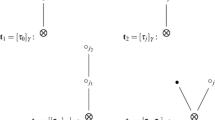Abstract
The aim of this paper is to derive a numerical scheme for solving stochastic differential equations (SDEs) via Wong-Zakai approximation. One of the most important methods for solving SDEs is Milstein method, but this method is not so popular because the cost of simulating the double stochastic integrals is high. For overcoming this complexity, we present an implicit Milstein scheme based on Wong-Zakai approximation by approximating the Brownian motion with its truncated Haar expansion. The main advantages of this method lie in the fact that it preserves the convergence order and also stability region of the Milstein method while its simulation is much easier than Milstein scheme. We show the convergence rate of the method by some numerical examples.
Similar content being viewed by others
References
Afanas’ev, V.N., Kolmanosvkii, V.B., Nosov, V.R.: Mathematical theory of control systems design. Kluwer Academic Publishers, 341 (1996)
Busenberg, S., Cooke, K.L.: The effect of integral conditions in certain equations modelling epidemics and population growth. J. Math. Biol. 10, 13–32 (1980)
Cao, W., Zhang, Z.H., Karniadakis, G.E.: Numerical methods for stochastic delay differential equations via the Wong-Zakai approximation. SIAM J. Sci. Comput. 37, 295–318 (2015)
Cheung, W.S., Ren, J.: Discrete non-linear inequalities and applications to boundary value problems. J. Math. Anal. Appl. 319, 708–724 (2006)
Clark, J.M.C., Cameron, R.J.: The maximum rate of convergence of discrete approximations for stochastic differential equations. Springer Lecture Notes in Control and Information Sciences 25, 162–171 (1980)
Higham, D.J., Mao, X., Szpruch, L.: Convergence, non-negativity and stability of a new Milstein scheme with applications to finance. American Institute of Mathematical Sciences 13, 2083–2100 (2013)
Kloeden, P.E., Platen, E.: Numerical solution of stochastic differential equations. Springer, Berlin (1992)
Londoño, J.A., Ramirez, A.M.: Numerical performance of some Wong-Zakai type approximations for stochastic differential equations, Tech. Rep., Department of Mathematics, National University of Colombia, Bogota, Colombia (2006)
Mackevicius, V.: On approximation of stochastic differential equations with coefficients depending on the past. Matematikos ir Informatikos Instituta 32, 285–298 (1992)
Omar, M.A., Aboul-Hassan, A., Rabia, S.I.: The composite Milstein methods for the numerical solution of Ito stochastic differential equations. J. Comput. Appl. Math. 235, 2277–2299 (2011)
Omar, M.A., Aboul-Hassan, A., Rabia, S.: The composite Milstein methods for the numerical solution of Stratonovich stochastic differential equations. J. Comput. Appl. Math. 215, 727–745 (2009)
Saito, Y., Mitsui, T.: Stability analysis of numerical schemes for stochastic differential equations. SIAM J. Numer. Anal. 33, 2254–2267 (1996)
Tian, T., Burrage, K.: Implicit Taylor methods for stiff stochastic differential equations. J. Comput. Appl. Math. 38, 167–185 (2001)
Tudor, C.: Wong-Zakai type approximations for stochastic differential equations driven by a fractional brownian motion. Eur. Math. Soc. 28, 165–182 (2009)
Twardowska, K.: On the approximation theorem of the Wong-Zakai type for the functional stochastic differential equations. Probab. Math. Stat. 12, 319–334 (1991)
Twardowska, K., Marnik, T., Paslawaska-Poluniak, M.: Approximation of the Zakai equation in a nonlinear filtering problem with delay. Int. J. Appl. Math. Comput. Sci. 13, 151–160 (2003)
Wong, E., Zakai, M.: On the convergence of ordinary integrals to stochastic integrals. Ann. Math. Stat. 36, 1560–1564 (1965)
Wong, E., Zakai, M.: On the relation between ordinary and stochastic differential equations. Int. J. Eng. Sci. 3, 213–229 (1965)
Author information
Authors and Affiliations
Corresponding author
Rights and permissions
About this article
Cite this article
Kamrani, M., Jamshidi, N. Implicit Milstein method for stochastic differential equations via the Wong-Zakai approximation. Numer Algor 79, 357–374 (2018). https://doi.org/10.1007/s11075-017-0440-8
Received:
Accepted:
Published:
Issue Date:
DOI: https://doi.org/10.1007/s11075-017-0440-8




